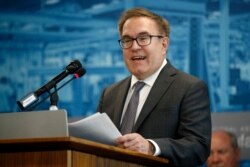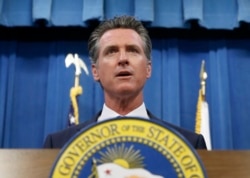The Trump administration is poised to revoke California's authority to set auto mileage standards, asserting that only the federal government has the power to regulate greenhouse gas emissions and fuel economy.
Conservative and free-market groups have been asked to attend a formal announcement of the rollback set for Wednesday afternoon at Environmental Protection Agency headquarters in Washington.
Gloria Bergquist, spokeswoman for the Alliance of Automobile Manufacturers, said Tuesday that her group was among those invited to the event featuring EPA Administrator Andrew Wheeler and Transportation Secretary Elaine Chao.
The move comes after the Justice Department recently opened an antitrust investigation into a deal between California and four automakers for tougher pollution and related mileage requirements than those sought by President Donald Trump. Trump also has sought to relax Obama-era federal mileage standards nationwide, weakening a key effort by his Democratic predecessor to slow climate change.
Top California officials and environmental groups pledged legal action to stop the rollback.
The White House declined to comment Tuesday, referring questions to EPA. EPA's press office did not respond to a phone message and email seeking comment.
But EPA Administrator Andrew Wheeler told the National Automobile Dealers Association on Tuesday that the Trump administration would move "in the very near future" to take steps toward establishing one nationwide set of fuel-economy standards.
"We embrace federalism and the role of the states, but federalism does not mean that one state can dictate standards for the nation," he said, adding that higher fuel economy standards would hurt consumers by increasing the average sticker price of new cars and requiring automakers to produce more electric vehicles.
Word of the pending announcement came as Trump traveled to California on Tuesday for an overnight trip that includes GOP fundraising events near San Francisco, Los Angeles and San Diego.
California's authority to set its own, tougher emissions standards goes back to a waiver issued by Congress during passage of the Clean Air Act in 1970. The state has long pushed automakers to adopt more fuel-efficient passenger vehicles that emit less pollution. A dozen states and the District of Columbia also follow California's fuel economy standards.
California Attorney General Xavier Becerra said Tuesday that the Trump administration's action will hurt both U.S. automakers and American families. He said California would fight the administration in federal court.
"You have no basis and no authority to pull this waiver," Becerra, a Democrat, said in a statement, referring to Trump. "We're ready to fight for a future that you seem unable to comprehend."
California Gov. Gavin Newsom said the White House "has abdicated its responsibility to the rest of the world on cutting emissions and fighting global warming."
"California won't ever wait for permission from Washington to protect the health and safety of children and families," said Newsom, a Democrat.
The deal struck in July between California and four of the world's largest automakers — Ford, Honda, BMW and Volkswagen — bypassed the Trump administration's plan to freeze emissions and fuel economy standards adopted under Obama at 2021 levels.
The four automakers agreed with California to reduce emissions by 3.7% per year starting with the 2022 model year, through 2026. That compares with 4.7% yearly reductions through 2025 under the Obama standards. Emissions standards are closely linked with fuel economy requirements because vehicles pollute less if they burn fewer gallons of fuel.
The U.S. transportation sector is the nation's biggest single source of planet-warming greenhouse gasses.
Wheeler said Tuesday: "California will be able to keep in place and enforce programs to address smog and other forms of air pollution caused by motor vehicles." But fuel economy has been one of the key regulatory tools the state has used to reduce harmful emissions.
Environmentalists condemned the Trump administration's expected announcement, which comes as gasoline prices have crept higher following a weekend drone attack that hobbled Saudi Arabian oil output.
"Everyone wins when we adopt strong clean car standards as our public policy," said Fred Krupp, president of Environmental Defense Fund. "Strong clean car standards give us healthier air to breathe, help protect us from the urgent threat of climate change and save Americans hundreds of dollars a year in gas expenses."







